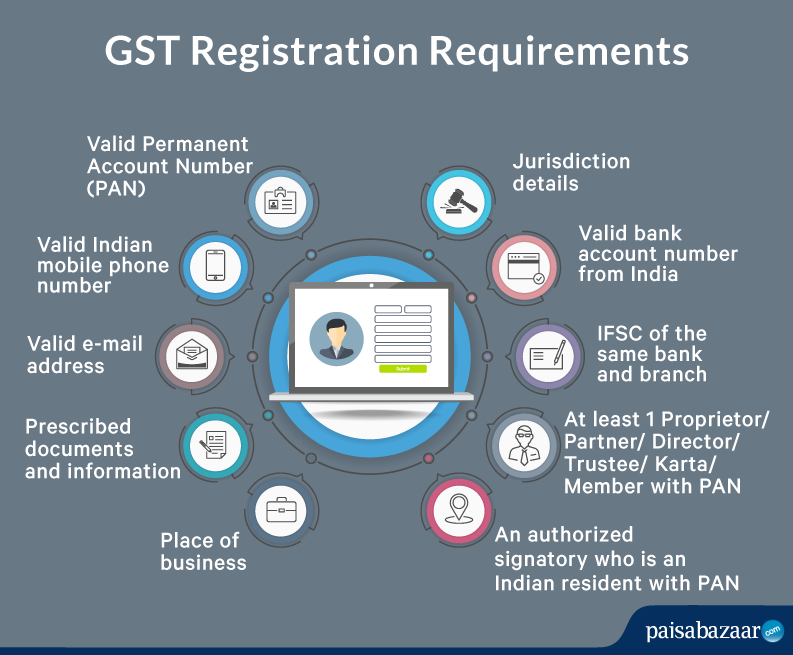Why Singapore GST Registration is Crucial for Your Startup
Why Singapore GST Registration is Crucial for Your Startup
Blog Article
Making The Most Of Tax Efficiency: Expert Tips on Browsing the GST Enrollment Maze for Small Companies
Navigating the intricate landscape of Item and Provider Tax Obligation (GST) registration can be a labyrinthine task for small companies aiming to maximize their tax obligation performance. Comprehending the eligibility criteria, meticulous documents demands, tactical timing considerations, and adept enrollment procedure pointers can dramatically affect a business's monetary standing. Compliance with GST laws is extremely important, and sticking to best practices can simplify procedures and stop potential pitfalls. In this conversation, we will discover skilled insights and workable recommendations that can equip small companies to navigate the GST enrollment puzzle effectively and maximize their tax performance.
Qualification Standards
Eligibility requirements for Small Business GST Enrollment encompass particular criteria that organizations need to meet to comply with tax obligation guidelines. To qualify for GST registration, an organization should have a yearly turnover exceeding the threshold established by the tax authorities, which differs by nation.

Paperwork Requirements
To effectively finish the process of GST enrollment, small companies should ensure they have all required documentation in order. The called for paperwork normally includes evidence of service registration or identification, consolidation and address proofs of business owner, pictures, checking account details, and proof of the major business. In addition, services need to give details of their organization tasks, including the items or solutions supplied. It is crucial to make certain that all documents are accurate, as much as date, and in the specified layout to stop hold-ups or denials throughout the registration process.
In addition to the mandatory papers, businesses may likewise be required to submit additional information based upon their particular conditions. This could include records related to collaborations, the authorization of signatures, or any other pertinent contracts. Maintaining all essential documents arranged and readily obtainable can streamline the enrollment process and assistance businesses conform with the needs successfully - Singapore GST Registration. Failing to provide the required paperwork may lead to hold-ups and even denial of the GST enrollment application. Precise attention to information and adherence to the paperwork guidelines are essential for a successful GST registration procedure for small businesses.
Timing Considerations
Considering the crucial paperwork needs have actually been meticulously resolved, the next crucial facet for little businesses beginning on the GST registration procedure is the critical administration of timing considerations. Timing plays a crucial function in GST enrollment, affecting not only conformity but additionally monetary facets of the organization. Local business require to thoroughly plan the timing of their GST registration to make best use of advantages and reference decrease possible dangers.

In addition, businesses should align the timing of their GST registration with their operational readiness. Ample preparation, such as upgrading bookkeeping systems and training personnel, is vital to seamlessly integrate GST needs into daily operations. By purposefully managing timing considerations, local business can navigate the GST enrollment procedure successfully and enhance their tax efficiency.
Registration Process Tips
Effectively browsing the GST enrollment process calls for tiny businesses to apply critical and positive enrollment process ideas. This consists of business registration papers, evidence of address, bank statements, and recognition evidence of the business owners.
Furthermore, understanding the limits and requirements for GST registration based on the certain state or region where business operates is important. Some states have various turn over thresholds that activate mandatory registration, so being notified regarding these limits can aid businesses prepare ahead.
One more beneficial tip is to consider seeking expert help from accounting professionals or tax obligation consultants who focus on GST enrollment. Their competence can simplify the process, minimize mistakes, and make certain compliance with all policies.
Conformity Ideal Practices
Browsing the GST registration process smoothly requires not just critical registration process tips but likewise thorough adherence to conformity best methods to make certain ongoing regulative placement. Local business should focus on conformity to avoid penalties and keep an excellent standing with tax authorities. One vital ideal practice is to keep exact and thorough records of all deals. This consists of invoices, receipts, and various other financial records that might be needed for tax obligation audits or conformity checks. Additionally, remaining educated regarding any type of updates or changes to GST guidelines is essential. pop over here Tiny business proprietors must routinely evaluate government standards and seek specialist guidance if required to ensure they are satisfying all requirements. It is likewise advised to file GST returns on time to prevent late fees and fines. By including these compliance best techniques into their procedures, small companies can browse the complexities of GST enrollment with confidence and performance.
Final Thought
In conclusion, small companies can navigate the GST enrollment labyrinth by guaranteeing they meet qualification criteria, gather needed documentation, take into consideration timing implications, follow enrollment process tips, and stick to compliance ideal practices. By maximizing tax obligation effectiveness with appropriate GST registration, services can improve their monetary monitoring and click to read operations.
Navigating the detailed landscape of Item and Solutions Tax (GST) enrollment can be a labyrinthine task for small companies aiming to optimize their tax obligation performance.Qualification demands for Small Company GST Registration incorporate certain requirements that businesses must fulfill to conform with tax laws. The needed documentation generally consists of evidence of business enrollment or unification, identity and address proofs of the organization owner, photographs, bank account information, and evidence of the primary location of service. In addition, organizations require to supply details of their company activities, including the products or services provided.Effectively navigating the GST registration process requires small businesses to apply proactive and calculated enrollment procedure tips.
Report this page